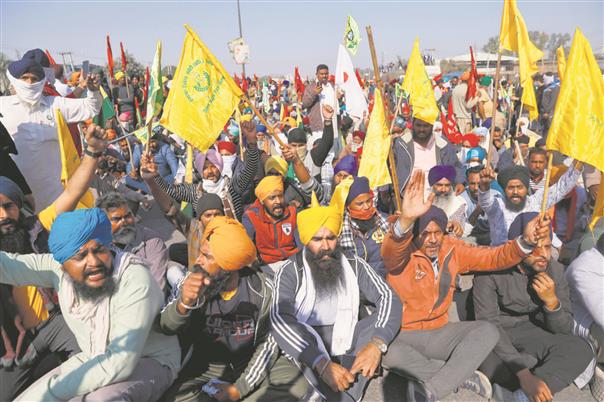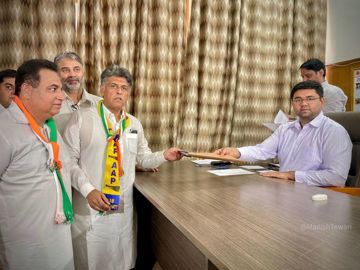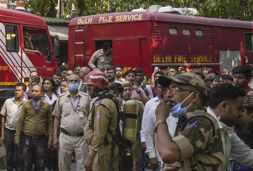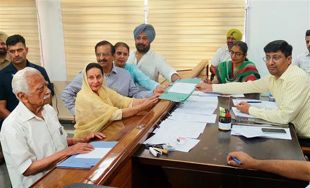
SIMMERING DISCONTENT: When farmers come protesting, governments can’t ignore them for their dissatisfaction does not bode well for the country. Reuters
Senior Political Commentator
Has the BJP lost its golden touch by not anticipating the agitation by the farmers of Punjab and Haryana? Thousands are sitting on the doorstep of Delhi, having come prepared to protest for as long as ‘six months’. They will not leave, they say, till the government scraps the three farm laws enacted by it. It’s a ‘marta kya na karta’ response by the farmers of the two states.
Or is the BJP going ahead, fully aware of what it is doing, in the belief that it will ride this storm also, as it has done so many times in the past? It got the better of demonetisation, despite the loss of jobs and the setback to the economy, and the introduction of the GST, however unthought through, or the sudden lockdown earlier this year which led to the mega march of the migrants walking hundreds of miles to their villages, an exodus the like of which India had not seen.
The BJP has been aware of the growing resistance to its ‘farm reforms’. It led to the severance of its relations with its oldest ally, the Akali Dal, which quit the NDA. And now comes the exit of another farmer-based party — Hanuman Beniwal’s RLP — from the NDA.
Initially, the Akali Dal had gone along with the government’s move, till it realised the strength of the ground sentiment against the farm laws. Its leaders were warned that they would not be able to enter the villages of Punjab. Parkash Singh Badal was gheraoed in his own village; a farmer committed suicide there. It was only then that the party decided that it had to do more than withdraw Harsimrat Kaur Badal from the Cabinet. It decided to quit the NDA. The BJP did not heed its plea that the Bills be sent to a select committee of Parliament. It would have given time to the government to engage with all the stakeholders, most importantly, the farmers exercised by the legislation, and go for a mutually acceptable solution. Even if nothing
had emerged out of the exercise, at least the farmers would have felt they were consulted.
The BJP may calculate that at the end of the day, they could always join hands with the Akali Dal again, if the situation so demands after the 2022 state elections. However, the significance of the break between the BJP and the Akali Dal goes beyond the exit of one more party from the NDA. The alliance, fashioned by Atal Bihari Vajpayee and Parkash Singh Badal, had brought Hindu-Sikh relations on an even keel, after a decade of turbulence in the border state.
The BJP may also believe it will somehow ‘manage things’. There were after all serious farmers’ protests in Haryana in 2017, at Mandsaur in Madhya Pradesh and at Nashik in Maharashtra which made a difference to the party’s tally in the polls in the three states. Yet the party formed the government in Haryana with jugaad and with jorh torh in Madhya Pradesh. Maharashtra remains on its radar.
And those very farmers of Haryana-and of Punjab — had voted for the BJP in 2019 after Pulwama and Balakot, when the issue was projected as one of a terror threat to the unity of India from across the border. In the past six years, the BJP has been able to trump any dissatisfaction and distress with its ultimate brahmastra of Hindutva and Hindu nationalism in one form or another, for winning elections. (Now it is getting ready with ‘love jihad’ as its latest tool in Uttar Pradesh, which goes to the polls in 2022).
In recent years, the Hindu-Muslim divide has gone deep into the psyche of large sections in the country. People have been swayed by issues of Hindu identity at poll time, even ignoring their economic distress. This is what the BJP is banking on.
In its second term, the BJP moved with alacrity to fulfil its political agenda. Within weeks of taking over in 2019, it abrogated Article 370 on August 5. Exactly a year later, on August 5, 2020, the Prime Minister went to lay the foundation stone of the promised Ram Temple in Ayodhya, in the midst of the Covid-19 pandemic. The temple is now under construction. It will, from all accounts, be ready at the end of 2023, in the run-up to the 2024 General Election.
Now, the BJP wants to move towards completing its economic agenda — and the farm laws are part of that plan. The government has also put into place changes in the labour laws. In 2015, the BJP had tried to enact the Land Acquisition Act, but there was so much opposition to it that it had to beat a hasty retreat.
While it has held talks with the farmers, and that is a welcome move, many in the BJP believe that the farmers’ stir will fizzle out. It may or may not do so. But it would do well to remember the history of the Sikhs and the many battles they have fought valiantly. It is a community known for its perseverance. These rural families send their children to be jawans in our defence forces. Their continuing dissatisfaction — or being dubbed Khalistanis by a couple of BJP leaders — is hardly desirable. A Sikh-Hindu divide in Punjab can be dangerous, given the recent history of the state.
Educated or not so educated, the agitating farmers realise what the corporatisation of agriculture and contract farming will mean for the smaller farmers. Even though the government is saying that the MSP system will continue, they know they will be forced to sell their surplus to the private players at a rate lower than the MSP — unless they can get an amendment in the law to make this a legal right, below which no private player can buy. Otherwise, there is every chance of the small farmer becoming a labourer on his own land, or compelled to seek work in the cities where jobs are anyway in short supply.
When farmers come protesting, governments cannot ignore them. Kisan leader Mahendra Singh Tikait of the Bharatiya Kisan Union had brought Delhi to a standstill in 1988. Rajiv Gandhi, then PM, had to listen to their demand for a higher price for their produce, even though the Congress had a brute majority of 415 members in the Lok Sabha at the time.
No doubt, there is a difference between then and now. The media is not what it was nor is the judiciary. Nor for that matter is the Opposition. Had there been a united Opposition in the country today — even though the 500-odd farmers’ organisations behind the current protest have kept politicians at bay — the issues being raised by the farmers of Punjab and Haryana would have had greater national resonance, and possibly elicited a swifter response from the government.
Join Whatsapp Channel of The Tribune for latest updates.




























